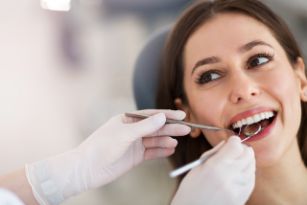
It goes without saying that habits can make you or break you – and that includes your dental health! By getting in the habit of seeing a dentist twice a year and spending a little time each day on your oral hygiene, you’ll get a big payoff: less time and money in the dental chair, a smile that looks and feels great, and even a better sense of overall well-being. Want to know more? Keep reading below about 3 of the most important habits you can develop for a healthy smile.
1. Be Consistent With Brushing and Flossing
Many people struggle with their brushing and flossing, but there are many hacks to make it easier. First, remember that you don’t have to be perfect, just consistent. For example, flossing just 3-4 times a week isn’t ideal, but doing it every week will make a big difference. Something is always better than nothing, and 3-4 times a week is a great place to start.
Second, try different tricks to make your routine more convenient. You might find it easier to brush and floss right after dinner instead of waiting until bedtime. Or, some people keep floss at work and do it after lunch each day.
Finally, experiment with one of the many tools out there that can help you be more effective. Electric toothbrushes, floss picks, interdental brushes, and oral irrigators are just a few of the possibilities that can help quite a bit.
2. Minimize the Harmful Effects of Sugar
These days, sugar is everywhere, but you don’t have to give up your favorite sweet foods and drinks entirely. In addition to simply reducing the overall sugar content in your diet, here are some ways to minimize its negative impact:
- Don’t snack or graze – Remember the phrase, “Sip all day, get decay.” If you want something sweet like soda or a coffee with sugar, try to finish it within 20-30 minutes instead of sipping on it throughout the day. And avoid grazing on carbohydrate-laden foods like candies, dried fruit, chips, etc. Simply enjoy them as a single snack or as part of a meal.
- Chew sugar-free gum – If you can’t brush after eating or drinking, chewing sugar-free gum is a great way to stimulate salivary flow and wash away plaque and food debris. It also neutralizes the acids that cause cavities.
- Swish with water – If you can’t brush and don’t have sugar-free gum handy after consuming something sweet, rinse your mouth out with water a few times to remove any harmful sugars and acids left behind.
3. Schedule Regular Checkups With a Dentist
It’s not uncommon to think that skipping checkups will save you time and money, but the truth is that it will actually cost you in the long run. When a dentist regularly monitors your teeth and gums, they can catch small problems before they turn into emergencies, take proactive steps to extend the life of your existing dental work, and alert you to early stages of gum disease or oral cancer.
Just like skipping oil changes and tire rotations on your car can lead to a major breakdown later on, neglecting regular checkups and cleanings can cause much bigger dental problems down the road.
When it comes to your oral health habits, it’s well worth it to make sure they’re working for you instead of against you. With a little time and effort, your smile will thank you!
About the Author
Dr. Amy E. Farrell has been a family dentist for nearly a decade and is a graduate of the University of Maryland Dental School. With a focus on prevention, she understands how much everyday habits impact her patients’ oral health and always provides helpful tips to help them minimize dental problems. If you have any questions about improving your oral health, she can be reached via her website.


